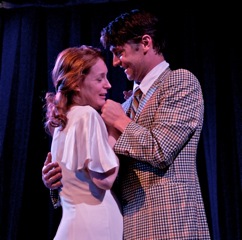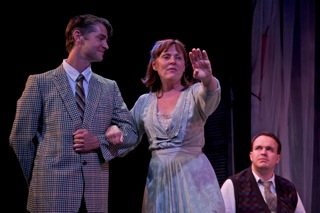Fuse Theater Recommendation: Tennessee Williams’ Original Acts Staged with Aplomb
In the perceptive hands of director Joann Green Breuer, the combination of scripts (stretching from the 1940’s to the 1970’s) proffers a compelling meditation on Tennessee Williams’s exploration of women and desire, as well as some surprising spins on his classic plays.
By Bill Marx.
Tennessee Williams: Original Acts by Tennessee Williams. Directed by Joann Green Breuer. At the Vineyard Playhouse, 24 Church Street, Vineyard Haven, MA, through August 6.

Dee Nelson and Scott Barrow in The Vineyard Playhouse production of TENNESSEE WILLIAMS: ORIGINAL ACTS. Photo: Sally Cohn
Reader forewarned: I am too tied up in conflicts of interest to review this production. The director, Joann Green Breuer, is a longtime friend who also writes for The Arts Fuse (she contributed an AF piece on Williams in honor of his 100th birthday this year). One of the performers in the Vineyard Playhouse production, Dee Nelson, is a friend as well. On top of all that, this production of four Williams one-acts (The Dark Room, Interior: Panic, The Pretty Trap, and I Never Get Dressed Until Dark on Sundays) is dedicated to my chum and comrade in the trenches, critic and director Skip Ascheim—this August marks the 11th year of his death at the age of 56.
So, that ethical duty done, I still feel duty bound to say that the superb production amply honors Skip and Tennessee. Given this centenary year, the latter has not received the attention you think he would from stages in the Boston area. Thus anyone interested in one of America’s greatest playwrights should take in this deftly moving production, made up of impeccable performances from Dee Nelson and the other members of the cast, Shelia Stasack, Peter Stray, and Scott Barrow.
The evening is built out of four plays selected from a recently published volume of unpublished Williams texts, The Magic Tower and Other One-Act Plays, that I reviewed for AF earlier this year. In the perceptive hands of director Joann Green Breuer, the combination of scripts (stretching from the 1940’s to the 1970’s) proffers a compelling, unified meditation on Williams’s exploration of women and desire, as well as some surprising spins on his classic plays. The dramatist’s restless mind, lyrical pen, and enduring talent are evident throughout.
In lieu of a review, I have asked Joann Green Breuer to respond to some questions about the production:
Arts Fuse: Why stage these rather than more familiar Williams’ scripts?
Joann Green Breuer: These scripts are not less familiar. For most folks, in and out of theatre, they are entirely unfamiliar. There is nothing like the excitement of discovery, for me and for audiences, especially if the discoveries are worthy ones, which I believe these definitely are.
AF: What are the challenges of staging these scripts?
JGB: All plays are or should be challenges. With these texts, perhaps the primary challenge is to forget expectations of characters that seem familiar. We have to confront these figures as new, unique, their circumstances fresh and their denouement a mystery. I was also eager to allow the evening grow as an integrated experience. The role which each actor incorporated have a relationship to be honored, inevitable, not as repetitions, but developing through twists of time as naturally as life.
AF: Do the plays shed light on Williams’ later plays?

Shelia Stasack, Scott Barrow, and Peter Stray in TENNESSEE WILLIAMS: ORIGINAL ACTS at the Vineyard Playhouse. Photo: Sally Cohn
JGB: The light of Williams’s early plays dims and expands into the shadows of his later plays. He often began his creative process with a poem, then maybe a story, then a play in one scene, then a masterful complexity of character and situation. In these early plays, we have a chance to feel what might have been, we have a chance to let joy come face to face with poignancy and pain, to experience a tender, delicate optimism, to witness later plays and sense what might have been.
AF: What does the final play, written in 1973, when many critics has written him off, say about Williams’ state of mind?
JGB: Williams was frustrated, I suppose. But the knives of critics did not destroy him. He knew “how to fall,” painful as that floor may be. I hope his taking control of the stage in I Never Get Dressed Till After Dark on Sundays will nudge folks to take another look at Williams’s later plays. I suspect that there is more there than had been noticed. Perhaps those critics and audiences were blinded by the expectation, or desire, that Williams would write the same plays, in the same, admittedly brilliant, lyrical language, over and over again. He did not. I say, thankfully. Tennessee Williams continued to create original worlds for the stage, to make the stage a mirror for selves we had not acknowledged, and to demand with compassion that, as another playwright penned, we pay attention.
